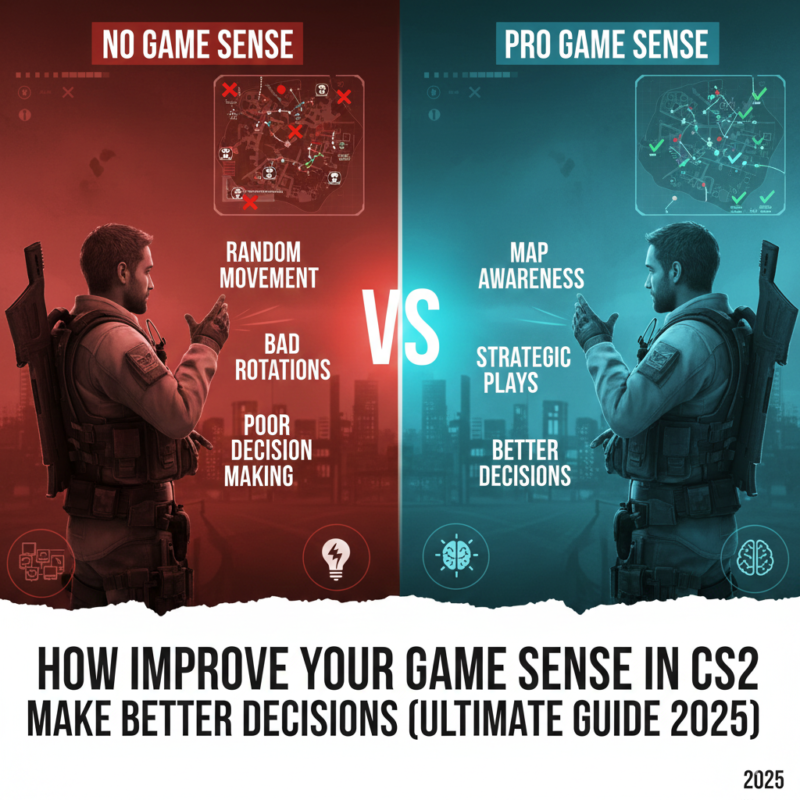Counter-Strike 2 Mods and Guides
How to Improve Your Game Sense in CS2 and Make Better Decisions
Game sense is one of the most misunderstood yet crucial aspects of Counter-Strike 2. While aim and mechanics are important, what truly separates an average player from an elite competitor is their ability to anticipate plays, read opponents, and react instinctively. Learning to Improve Your Game Sense in CS2 can elevate your entire performance, especially in tight clutch situations or high-ranked matches.
Developing game sense isn’t something that happens overnight—it’s built through experience, observation, and intentional practice. This guide will help you understand what game sense really is, how to sharpen it, and how professional players make smarter, faster decisions under pressure.
Understanding What Game Sense Means in CS2
In simple terms, game sense refers to your ability to predict and respond to the flow of the game. It’s not about raw mechanics but rather mental awareness—understanding map control, reading enemy tendencies, and using timing to your advantage.
For example, if your team loses control of mid on Mirage, a player with strong game sense will anticipate a B split and adjust positioning accordingly. These subtle decisions often define whether a team wins or loses a round.
Game sense involves elements like map awareness, economy understanding, team coordination, and even psychology—knowing how opponents think and react.
Learn From Watching Professional Matches
One of the fastest ways to Improve Your Game Sense in CS2 is to watch pro matches. Platforms like HLTV.org and ProSettings.net are excellent for analyzing how top-tier players approach different situations.
When watching, focus on what the players do without firing a single bullet—their rotations, positioning, and utility usage. Notice how a player like NiKo or m0NESY knows exactly when to fall back, re-peek, or save. These moments reflect deep understanding of timing and opponent behavior.
Study demos and slow them down to dissect why specific decisions were made. Over time, you’ll start recognizing these patterns in your own gameplay.
The Importance of Sound and Map Awareness
Sound cues are among the most underutilized aspects of improving game sense. In CS2, footsteps, reloads, and utility usage provide valuable information about enemy locations. A player with strong awareness can often predict pushes before they happen simply by listening.
Spend time learning how sounds carry across maps. Knowing how close an opponent is based on audio can help you decide whether to reposition or hold your ground. Combine this with map knowledge—angles, choke points, and bombsite timings—to anticipate rotations effectively.
Recognizing Patterns in Enemy Behavior
Great CS2 players don’t just react—they anticipate. Every team and player develops habits over time, such as specific utility setups, peek timings, or favored bombsites. Identifying these tendencies is a massive part of game sense.
When you notice that the opposing team prefers late-round executes on A, for instance, you can adjust your team’s defense to counter it preemptively. Similarly, when an enemy lurker frequently flanks through mid, call for utility control or a delayed check.
Learning to read your opponents allows you to stay one step ahead, which is a hallmark of excellent decision-making.
Balancing Aggression and Patience
Game sense isn’t only about analysis—it’s about knowing when to act. Sometimes pushing an unexpected angle catches opponents off guard, but at other times, over-aggression can cost your team the round.
A smart player recognizes the rhythm of the game. If your team has already secured map control, there’s no need to overextend. Conversely, when your opponents are saving or low on utility, taking calculated aggression can pay off.
Mastering this balance requires intuition developed through experience—making mistakes, reviewing them, and learning when patience wins more rounds than recklessness.
Using Utility Intelligently
Every flashbang, smoke, and molotov should serve a strategic purpose. Proper utility usage not only aids your team but also denies information to the enemy—crucial for decision-making.
A player with refined game sense doesn’t throw utility randomly. Instead, they use it to control enemy movements or create pressure on other parts of the map. For example, a single fake smoke on A can force a rotation, buying your team time for a B hit.
Improving utility usage is one of the easiest ways to build better situational awareness in your matches.
Reviewing Your Own Gameplay
Watching your replays is one of the most effective yet underused tools to Improve Your Game Sense in CS2. After each competitive match, take a few minutes to review key rounds—especially the ones you lost.
Ask yourself questions like:
- Did I overcommit to a peek without information?
- Could I have rotated sooner?
- What did the enemies do before pushing a site?
By identifying your recurring mistakes, you can adjust your decision-making process and avoid falling into predictable patterns.
Practicing With Intent
Every time you queue up for a match, set a clear goal. Maybe you want to focus on better mid-round calls or improving your post-plant positioning. Intentional practice trains your mind to stay alert and observant rather than just reacting instinctively.
Custom servers and practice maps can help you simulate scenarios to test your timing or utility strategies. The more you internalize these patterns, the more natural your decision-making becomes in real matches.
Building Chemistry With Your Team
Team coordination plays a massive role in decision-making. When you understand how your teammates think, you can make faster, more confident plays. Communication builds trust, and trust allows for synchronized strategies.
Try to play consistently with the same group of players. Over time, you’ll develop shared instincts—when to push, when to rotate, and when to bait. This synergy amplifies everyone’s game sense, turning your team into a more cohesive and unpredictable force.
If you’re looking for balanced teammates, consider upgrading your matchmaking experience by getting a Buy CS2 Account to find better lobbies and more reliable players.
Conclusion: The Path to Smarter Play
To Improve Your Game Sense in CS2, you need to think beyond mechanics. It’s about awareness, prediction, and adaptability—skills that grow through study, reflection, and teamwork.
Every professional you admire has spent years mastering these subtle aspects of gameplay. Whether you’re climbing ranks or aiming for competitive success, developing strong game sense will make you a more reliable and intelligent player.
Start by observing pros, reviewing your demos, and refining your decision-making habits. Soon enough, you’ll find yourself anticipating plays rather than reacting to them—and that’s when you truly understand the rhythm of CS2.


